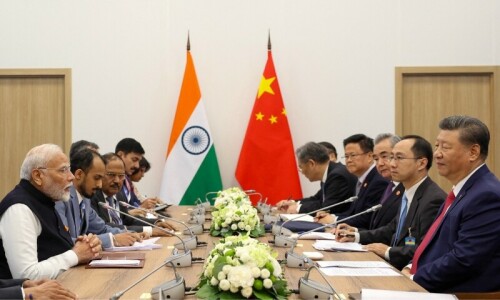FRANZ Kafka’schef d’oeuvre The Trial portrays the ordeal of Joseph K, who undergoes arbitrary arrest, investigation and prosecution. Throughout the novel, the nature of Joseph’s crime is not revealed to him. Moreover, it remains undisclosed why he was prosecuted, who prosecuted him and under what law he was prosecuted. At the end, his execution by purported members of law-enforcement agencies leaves everything unanswered.
The rule of law mandates that the law is the sole source of executive power; state institutions can only exercise such power as vested in them by the law. Likewise, Article 4 of our Constitution permits state institutions to do only what they are authorised to do by law. Thus, any exercise of power by the executive which is not conferred on it by law violates Article 4. Celebrated jurist Justice Fazal Karim in his book Access to Justice observed that the right conferred by Article 4 is more basic than even the fundamental rights since the latter can be suspended in certain circumstances but Article 4 cannot.
The Supreme Court in ‘PML-N vs Federation of Pakistan’ held “there is no inherent power in the executive, except what has been vested in it by law”. Essentially, the apex court upheld the principle that the structure of the government, and the powers which belong to the different parts of its structure, are defined by the law, which also prescribes the mode of exercising these powers. Hence, in view of this binding judgement, every executive action has to be justified with reference to some law, otherwise, such exercise will be void.
Our Constitution envisages a republican form of government guaranteeing due process and the rule of law. Also, the law of the land unequivocally defines powers of all instrumentalities of state. Yet, the ground reality is different, the republican ideals of our constitutional scheme stand outweighed by the unwanted donations of an informal unconstitutional regime. Presently, we are the subjects of a hybrid regime which appears to be democratic but whose actions are no less than unaccountable tyranny. Power is exercised by those who have no legal mandate to do so. Many can discern a pattern of totalitarianism where state institutions’ appetite for exercising un-conferred powers is insatiable.
Fair procedure is crucial to the survival of fundamental rights.
Whilst doing so, the ‘unknown’ authorities act under a cloak of invisibility. For instance, who attacked Ayaz Amir? Who shot and wounded Absar Alam? Who abducted Matiullah Jan, and why did the cameras reportedly stop working when he was whisked away? Who is behind the registration of multiple FIRs against Arshad Sharif? Who ordered a prison van to be parked outside parliament? Who had ordered Dr Rizwan’s name to be placed on the no-fly list? Who coerces television channels to fire journalists? Who intimidates cable operators to shut down channels?
Powers that have not been legitimately conferred are always exercised in an unfair manner since the unknown authority is not required to adhere to procedural fairness. Article 4 and 10-A of the Constitution also provide for procedural fairness. Fair procedures are crucial to the survival of various other fundamental rights; the exercise of un-conferred powers by unknown entities impair citizens’ fundamental rights in particular Articles 9 (life), 10 (arrest) and 14 (dignity and privacy). Fundamental rights cannot be treated lightly as their sanctity is protected by Article 8(2) of the Constitution, which declares void any legislative or executive action by virtue of which fundamental rights may be taken away. A person’s house cannot be his palace, his property cannot be his own, he is stripped of his right to express his opinion, if for the exercise of any of these rights he can be searched, apprehended and humiliated by unfair procedures.
Whenever someone suffers from the exercise of un-conferred powers by an unknown authority, the state loses its legitimacy. States cannot abandon their victims; and ‘unknown’ entities must be held accountable. Keeping in mind the fact that our law-enforcement agencies are supposed to be competent, the consistent failure of the police even to identify the wielders of such powers makes one thing clear, either the unknown entities are too powerful or the state is complicit. This is borne out by the fact that most of the victims are those who are critical of the establishment.
We don’t live in Kafka’s world; these unscrupulous actions by unknown elements have to stop. The Constitution envisages only one form of government — democracy. The rule of law and democracy are two sides of the same coin, and the absence of one makes the other irrelevant. Until such time these elements stop exercising powers which have not been conferred on them, democracy will remain a pipe dream.
The writer is a lawyer based in Lahore.
ask.niaze@hotmail.com
Published in Dawn, July 16th, 2022













































